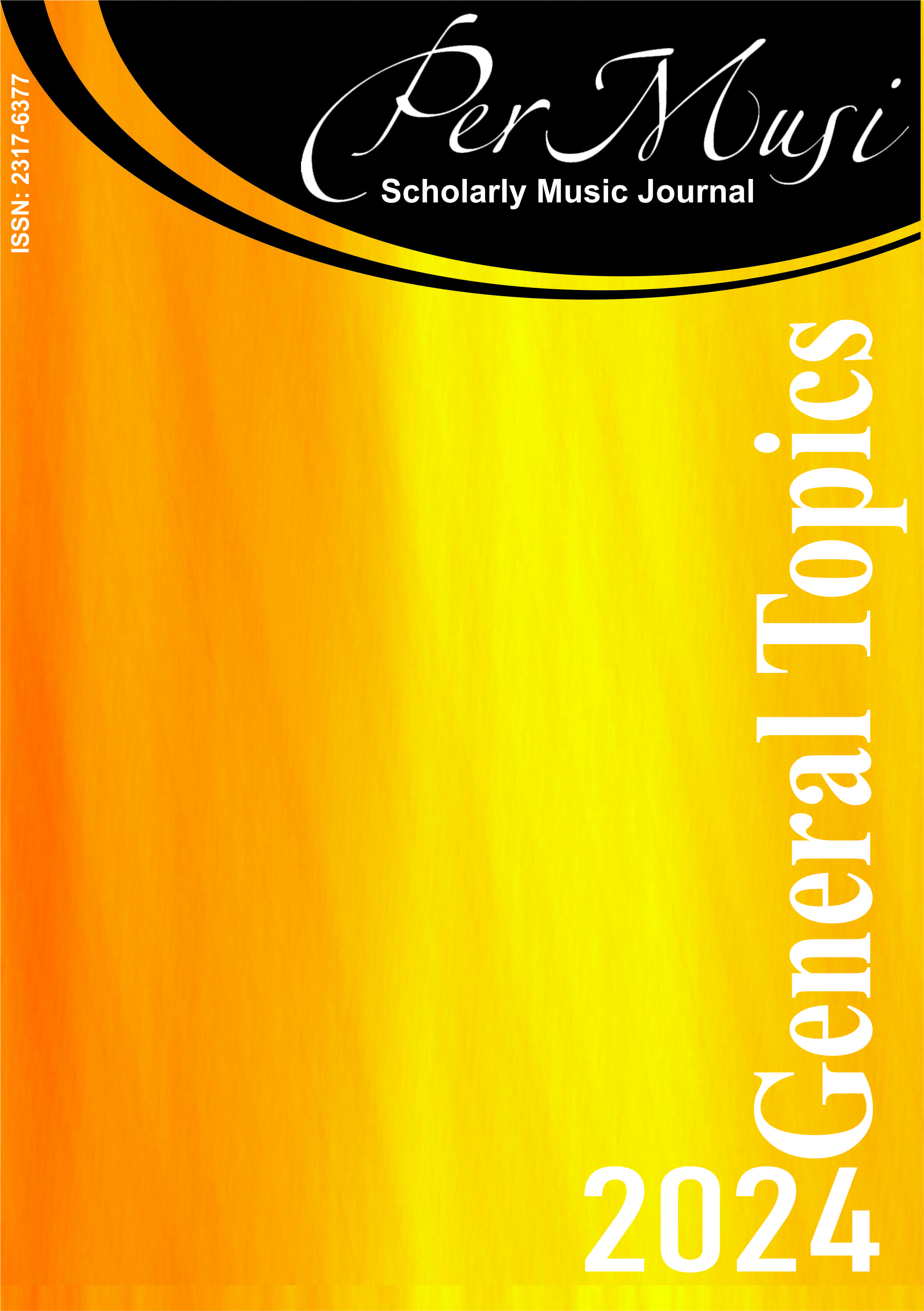Los pedagogos de la dirección
diálogo con el director de orquesta Eduardo Lakschevitz, primer acto
DOI:
https://doi.org/10.35699/2317-6377.2024.48665Palabras clave:
Eduardo Lakschevitz, Enseñanza y aprendizaje de la dirección, Pedagogos de direcciónResumen
Compartir experiencias de la vida académica, artística y profesional en el campo de la dirección de orquesta promueve la reflexión sobre la formación de los directores de orquesta. ¿Qué hace falta para ser director de orquesta? ¿Cómo se equilibra la teoría y la práctica? ¿Qué técnicas pedagógicas son esenciales en la formación de un director de orquesta? Esta entrevista es la primera de una serie de diálogos con directores de orquesta nacionales (Brasil) e internacionales. El primer invitado es el director de orquesta y profesor Eduardo Lakschevitz. En sus viajes entre Brasil y Estados Unidos, Lakschevitz trabaja intensamente como coordinador y pedagogo de los Paneles de Dirección Coral de FUNARTE, y sus acciones se reflejan en la producción y difusión de repertorio coral y en cursos de formación para directores y educadores. Dar voz a directores como Lakschevitz nos permite visualizar nuevas perspectivas prácticas, conceptuales y pedagógicas, y dirige nuestra mirada hacia las necesidades reales del campo de la dirección: pensar y actuar más allá de la técnica gestual.
Referencias
Becker, Howard. 1982. Art Worlds. Berkeley: University of California Press.
Blum, David. 1977. Casals and the art of interpretation. Los Angeles: University of Califórnia Press.
Cerqueira, D. 2021. Pesquisa Artística: um breve panorama. Revista Interdisciplinar em Cultura e Sociedade (RICS), 7(1), 28-43.
Cotrell, Stephen. 2006. Music, Time, and Dance in Orchestral Performance: The Conductor as ShamanThe conductor as a shaman. Twentieth-century music, Cambridge, 3/1, p. 73–96.
Farberman, Harold. 1997. The art of conducting technique: a new perspective. Florida: Warner Bros.
Frederickson, Jon e Rooney, James F. 1990. “How the Music Occupation Failed to Become a Profession”. International Review of the Aesthetics and Sociology of Music, Zagreb, v. 21, n. 2, p. 189-206, dez, 1990.
Latour, Bruno. 2012. Reagregando o Social: uma introdução à Teoria do Ator-Rede. Trad. Gilson César Cardoso de Sousa. Salvador/Bauru: Edufba/Edusc.
Lakschevitz, Eduardo. 2009. Um canto comum: percebendo o coro de empresa como um mundo artístico. 2009. Tese (Doutorado em Música) – Programa de Pós-Graduação em Música, Centro de Letras e Artes, Universidade Federal do Estado do Rio de Janeiro.
Lakschevitz, Elza. “Coro infantil”. In Lakschevitz, Eduardo (Org.). 2006. Ensaios: olhares sobre a música coral brasileira. Rio de Janeiro: Oficina Coral, 2006.
Lima, Erickinson Bezerra de., Oliveira, André Luiz Muniz., Souza, David., & Almeida, Victor. .2023. Estado da Arte: a produção científica brasileira nos primeiros 20 anos do séc. XXI no campo da regência. Orfeu, 8(2), e0208. https://doi.org/10.5965/2525530408022023e0208.
Lima, Erickinson Bezerra de., & Barros, Klênio. 2021. Diálogos desclassificados: a música e a voz por trás da teoria da desclassificação, segundo passo. Orfeu, 6(1). https://doi.org/10.5965/2525530406012021e0019.
Matos, Gregório de. 1992. “Ao braço do mesmo Menino Jesus quando apareceu”. In: Obra poética. Org. James Amado. Prep. e notas Emanuel Araújo. Apres. Jorge Amado. 3.ed. Rio de Janeiro: Record.
Nattiez, Jean Jaques. 2005. “O desconforto da musicologia”. Per Musi, Belo Horizonte, n.11, p 5-18, jan – jun.
Praude, Carlos C. 2016. “Teoria Ator-rede e Arte”. Anais Do 15º Encontro Internacional de Arte e Tecnologia (#15.ART) 15: 14-21.
Rudolf, Max. 1994. The grammar of conducting: a comprehensive guide to baton technique and interpretation. California: Schirmer, Thomson Learning.
Scherchen, Hermann. 1989. Handbook of conducting. New York: Oxford.
Schuller, Gunther. 1997. The compleat conductor. New York: Oxford University Press.
Descargas
Publicado
Número
Sección
Licencia
Derechos de autor 2024 Per Musi

Esta obra está bajo una licencia internacional Creative Commons Atribución 4.0.

Excepto cuando se indique lo contrario, el contenido de este sitio está sujeto a una Licencia Creative Commons - Atribuição 4.0 Internacional.












